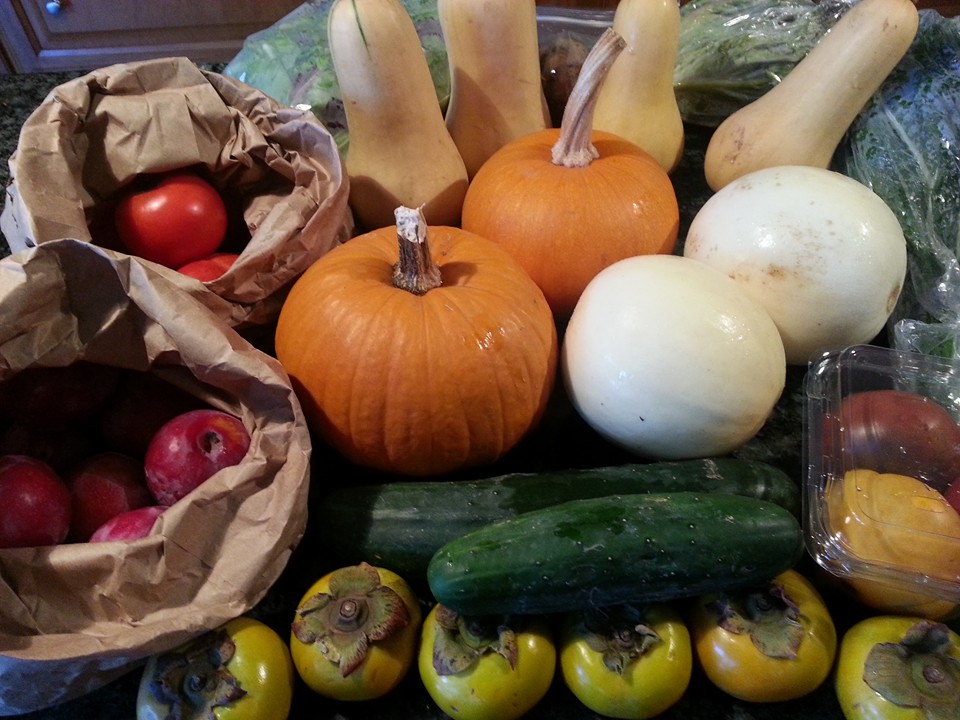\ˈskwäsh\
It is in fact a lovely case of convergent evolution. The verb squash (meaning to crush or squeeze flat) comes from the Old French escasser (“to crush, shatter, destroy, or break,”). This in turn comes from the Vulgar Latin *exquassare, from Latin ex- “out” plus quassare “to shatter.” It’s related to quash, and to squeeze, and (distantly) to scud.
But squash the noun—the word for the things covering my counter—comes from the Narraganset word askuutasquash. This word is a compound of askut, meaning “green, raw, uncooked” + asquash “thing that may be eaten” – so “a green thing that may be eaten raw.” My sources helpfully note that in the Algonquian languages –ash is a plural affix, which is appropriate because, as anyone who has ever cultivated a zucchini patch knows, there is never only one squash.
But if the word was brought into English by contact with Native Americans does that mean that squash was unknown to Europeans before contact with the Americas? The answer is a little bit involved.
There have been gourds and squashes pretty much since there have been people. In fact these might be the first plants ever to have been domesticated. DNA analysis suggests that members of the Cucurbitaceae family (especially bottle gourds) were being domesticated in Asia and Africa from about 12,000–13,000 years ago. Some members of the family made their way to the Americas (possibly by being carried or possibly by floating), where various MesoAmerican peoples started cultivating them, eventually giving rise to much of the bounty on my counter: thin-skinned summer squashes like zucchini, pattypan, and crookneck, and hard-shelled winter squashes like pumpkin, acorn, and butternut.
But while Europeans, Asians and Africans did not have access to pumpkins and zucchini before 1500, other cucurbits—including melons, gourds, and cucumbers—were well known. Folks in pre-contact Europe may have languished for want of pumpkin pie (not to mention BLTs and tater tots), but they at least had cucumbers and melons. And colorful metaphors thereby: Arwulf tells me that the Latin word for cucumber (cucurbita) also meant “dolt,” not unlike our idiom “melon-head.”
(Side note: when I was a kid I would sometimes catch Richard Pryor movies on afternoon TV. These movies were heavily overdubbed for broadcast and I was puzzled for quite a long time about why Pryor seemed so fixated on “melon-pickers.” Just about EVERYONE in those movies was called a melon-picker at one point or another.)
Now, of course, all kinds of squashes are grown pretty much everywhere. Wikipedia tells me that China alone produces more than 6 million metric tons of squash every year, plus 41 million metric tons of cucumbers and 57 million metric tons of watermelon. And the good folks at our local CSA are not far behind. There are something like 975 identified species in the Cucurbitaceae family, and I believe we have sampled most of them. We’ve had casseroles and breads, pies and side dishes and agua fresca. I have the creeping sense that something is about to come sprouting out of the discarded rinds and seeds in the trash and envelop the kitchen in inescapable tendrils.
Not for nothing are squashes and gourds nigh-on universal symbols of fertility, being not only suggestively round and firm and full of seeds, but also insanely prolific.
| I comfort myself by remembering that when our culinary invention runs dry there is another nice instance of the convergence between the Latin exquassare and the Narraganset askuutasquash: science departments at many colleges and universities have a Halloween tradition of freezing pumpkins in liquid nitrogen and dropping them off the roofs of buildings. This not only squashes the squash, it does so in a way very much in keeping with the original Latin meaning: the pumpkin shatters outwards with a satisfying boom. Thus the ex-quassare creates an ex-squash. | Video of a pumpkin drop at the University of Oregon. NB: the first pumpkin that drops is not frozen and as such is a little disappointing. For the real deal, fast forward to 0:41 |


 RSS Feed
RSS Feed